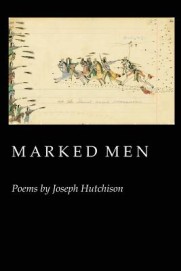 Joseph Hutchison
Joseph Hutchison
Turning Point ($18)
by Dale Jacobson
Joseph Hutchison, recently appointed to the position of Poet Laureate of Colorado, is the author of more than a dozen poetry collections. His careful, patient voice nonetheless carries an undercurrent of intense inquiry and passion, as in these lines from the poem “Dark Matter”:
Odd, how the notion relaxes my knotted throat.
Everything must go! Cities. Farms. Nations.
Earth itself will be slag– a frozen tear . . .
Hutchison’s poetry often contemplates loss and suffering, both from a personal and, as above, an objective vantage. Regardless of perspective, we find compassion for those left out, critique of dishonesty that produces harm, and insistence that we confront ourselves.
While his poems can engage in very effective political criticism, Hutchison’s newest book, Marked Men, is somewhat different. It contains the long poem “A Marked Man,” a dramatic historical poem about the massacre at Sand Creek. On vivid display is the principled courage of the central character, Silas Soule, who refused to allow his men to engage in the massacre and afterward testified against the commander, Colonel Chivington. Soule’s unwillingness to agree to the prevailing prejudice against Indians resulted in his murder. His ability to challenge his times—a quality we hardly see enough today—marks him as an individual who could truly think for himself. At one point Soule declares, “Facts are not personal.” I am reminded of Arundhati Roy’s observation: “When the president of the most powerful country in the world doesn't need to care what the facts are, then we can be sure we have entered the Age of Empire.”
The poem itself is very well written, utilizing tension, drama, foreshadowing, varied points of view, all of which make it engaging to read. In addition, it is well researched and accurate. Brecht argued for historical plays as a method of gaining the detachment needed to assess and address contemporary issues; this poem successfully accomplishes the same result.
There are other motifs, too. A fake reporter sent by Chivington provides apt commentary on the self-censorship of our modern media. The murderer talks of how Soule’s testimony threatens “Our work. Our wealth. Our dreams,” and of how the law is “but a word,” again a reminder of how the powerful in our own era disregard and manipulate the law of the land for their own well being.
The poem offers no resolution of these issues; instead, we wait together, listening at the graveyard that is our past. And yet, the value of this well-constructed poem is that it provides a lens to examine the injustice of our past, one much needed as we look to the kind of tomorrow we might create.

